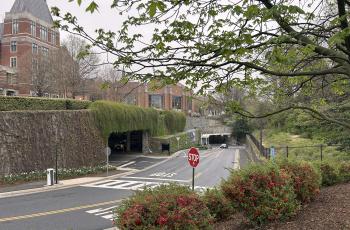
From large farms to community gardens, DC Water produces Class A Exceptional Quality biosolids that can be added to the soil and can help plants grow. Biosolids are produced at our Blue Plains Advanced Wastewater Treatment Plant during the wastewater treatment process. There, the solid materials are separated from the liquids and sent to our new state-of-the-art thermal hydrolysis process and digesters. This equipment adds heat, pressure and helpful bacteria to the solids to destroy harmful pathogens and reduce odor. The final product is a nutrient-rich product similar to soil called biosolids.
Some of the biosolids produced at Blue Plains are exported and applied to farms in Maryland and Virginia as a soil amendment. Applying biosolids to the land helps capture carbon and prevents it from being released to the atmosphere. Biosolids application also helps to recycle important nutrients like phosphorous and nitrogen back into the soil instead of releasing them into our waterways. The use of biosolids also reduces our carbon footprint and saves energy when compared to conventional petroleum based fertilizers.
Make your Garden Bloom
Now you can use our product at home! DC Water produces Bloom, a soil amendment made to restore urban soils and bring community gardens back to health at an affordable price. Bloom is now available in bulk quantities for soil blenders, landscapers, community groups and governments in DC and Maryland. Bloom provides larger crop yields, better drought resistance and is great for the home garden and lawn care. Find out more about Bloom or sign up for updates.
DC Water’s soil amendment products meet all U.S. Environmental Protection Agency (EPA) standards. Our Class A biosolids are essentially pathogen-free and have very low levels of metals. At DC Water, we go beyond these standards to produce EPA-certified Exceptional Quality biosolids.
You can read more about our biosolids in our biosolids fact sheet.
For information on federal and state biosolids regulation and oversight, visit the National Biosolids Partnership website or the Virginia Biosolids Council website.



